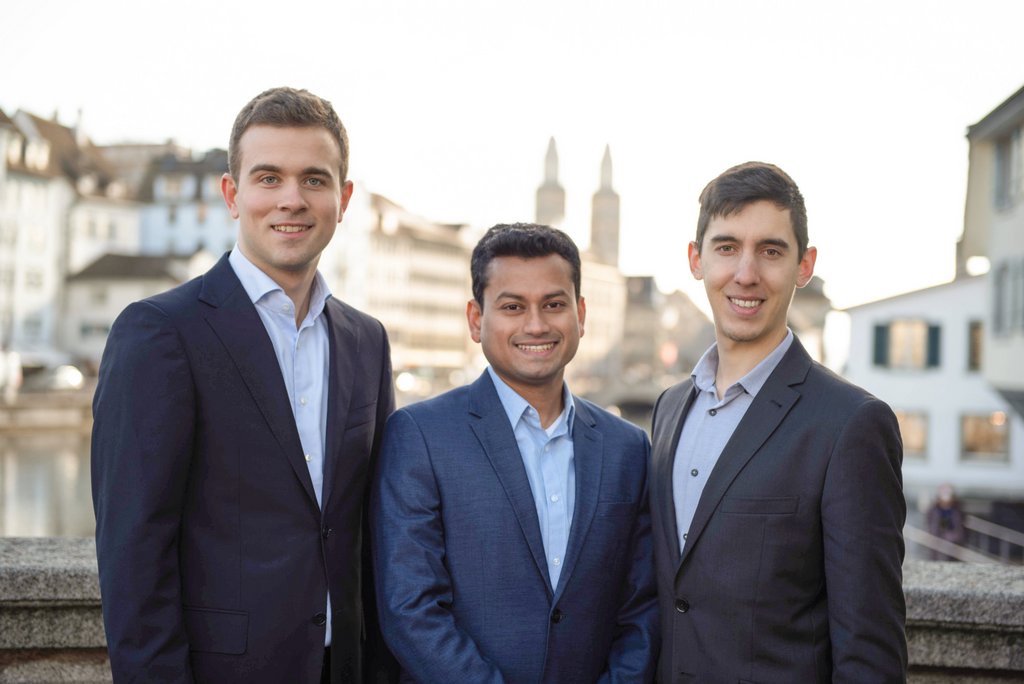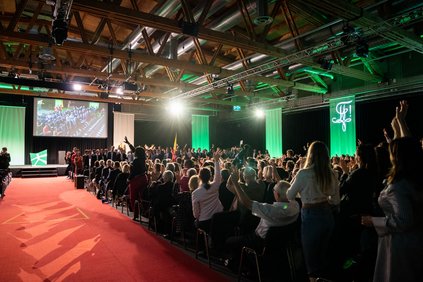Campus - 15.02.2024 - 09:30
A revolution against the sleep lab
Sleepiz devices can measure breathing and heart rate during sleep without contact. The HSG-affiliated start-up has thus created a small revolution in the detection and monitoring of chronic respiratory and lung diseases.

The HSG-affiliated start-up Sleepiz has created a small revolution in the detection and monitoring of chronic respiratory and lung diseases.
Until now, anyone who wanted to be tested for sleep apnoea had to be prepared for a time-consuming and costly visit to a sleep laboratory. There, you were fitted with numerous electrodes and then expected to sleep as normally as possible in an unfamiliar environment.Max Sieghold (29) and his co-founders Dr Soumya Dash (35) and Dr Marc Rullan (32) wanted to challenge this costly and unpleasant procedure by founding Sleepiz in 2018. Sieghold and Dash met a year earlier in a high-tech start-up management course organised by HSG and ETH, which brought together students and doctoral students from both universities. Sieghold was doing his Master's in Accounting and Finance at HSG and Dash was a PhD student at ETH, researching ways to collect contactless vital signs data. Sieghold, who already had work experience in the medical technology industry, was excited about the possibilities offered by this contactless approach. And so, the two of them teamed up with Marc Rullan, who was also studying at ETH, and developed a prototype within a year. In addition, they were already exploring market opportunities for a device that can detect sleep apnoea without contact.
Supported by the HSG programme
This one-year discovery phase was promising and so they decided to officially found the company. They were supported by Startup@HSG, where they received funding as part of the "HSG Entrepreneurial Talents" programme. The programme supports HSG students with a promising business idea through coaching, the provision of infrastructure and a small amount of start-up funding, among other things. "The programme also gave us access to numerous important networks in the start-up sector," says Max Sieghold. In this way, the two founders also got to know a business angel who continues to co-finance them to this day. The foundation for further business development had now been laid.
Development team set up in India
Now the young entrepreneurs were faced with a number of challenges. In order to bring the product to market properly, they had to look for a team of engineers. However, recruiting them in the Zurich area proved to be difficult. "Back then, we couldn't pay the insane salaries that other large tech companies in the area could," explains Sieghold. This is where Soumya Dash's Indian roots saved the start-up. Sieghold's co-founder still had good contacts in his home country and so the young company was able to build up a team of engineers in India to help with product development. However, Sieghold advised against taking this step recklessly. "Setting up a development team abroad only worked out so well for us because we also had a cultural bridge with Soumya."
Pulse measurement through the duvet
The intercultural team was finally able to develop a market-ready product that achieves amazing things. Using electromagnetic waves in the radar frequency range, the device can detect changes in a body's movement in the range of a tenth of a millimetre, even through the blanket. The device then uses machine-learning algorithms to detect breath and even heart beats from these changes in movement. "You can simply place it next to the bed without connecting to it and it records both breathing and pulse throughout the night," explains Sieghold.
Even though the technical feasibility had now been proven, the device still had to obtain authorisation as a medical device. "Much stricter regulations apply in this area than for other technical devices. However, after four years, we managed to obtain Swiss and European approval relatively quickly."
Expansion into the USA
Sleepiz was not satisfied with that. The team then set about making the leap across the pond. Last year, they were given the green light by the US Food and Drug Administration (FDA) and now want to scale up their business there. In particular, the devices will also be able to be used to monitor numerous chronic lung diseases such as asthma and COPD. In Switzerland, the three young entrepreneurs have also expanded vertically and founded the telemedicine company Aurora Telemed, AG. The company also offers medical and therapeutic counselling following sleep analysis.
Image (f.l.t.r.): Max Sieghold, Soumya Dash, Marc Rullan
More articles from the same category
This could also be of interest to you
Discover our special topics















